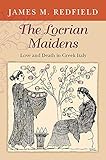The Locrian Maidens : Love and Death in Greek Italy / James M. Redfield.
Material type: TextPublisher: Princeton, NJ : Princeton University Press, [2022]Copyright date: ©2004Description: 1 online resource (477 p.) : 28 halftonesContent type:
TextPublisher: Princeton, NJ : Princeton University Press, [2022]Copyright date: ©2004Description: 1 online resource (477 p.) : 28 halftonesContent type: - 9780691223810
- Marriage -- Italy -- Locri Epizephyrii (Extinct city)
- Marriage -- Italy -- Locri Epizephyrii (Extinct city)
- Women -- Italy -- Locri Epizephyrii (Extinct city)
- Women -- Italy -- Locri Epizephyrii (Extinct city)
- HISTORY / Ancient / Greece
- Achelous
- Achilles
- Aegidae
- Aeneas Tacticus
- Aeneas
- Agesilaus
- Aianteioi
- Alcibiades
- Boreas
- Caesar
- Callimachus
- Carneia
- Clearchus
- Cleisthenes
- Dardanids
- Darius
- Deianeira
- Deinomenids
- Eupolis
- Gelon
- Hecataeus
- Hecate
- Hector
- Heracleidae
- Hermocrates
- Hipparchus
- Hyacinthia
- Hypermnestra
- Iamblichus
- Iodama
- Isthmia
- Kinyras
- Laconia
- Lemnian women
- Linus
- Locri Painter
- Locrian harmony
- Lyandros Painter
- Lysandridas
- aggression, male
- banquets
- barbarians
- bestiality
- candelabra
- centaurs
- earthquakes
- egalitarianism
- elements
- eternity
- exemplary prophets
- feasting
- flutes
- frontiers
- giants
- gift exchange
- grandchildren
- incense burners
- intellectual development
- jewelry
- lotuses
- love stories
- 306.81/0937 22
- HQ630.15.L63
- HQ630.15.L63
- online - DeGruyter
| Item type | Current library | Call number | URL | Status | Notes | Barcode | |
|---|---|---|---|---|---|---|---|
 eBook
eBook
|
Biblioteca "Angelicum" Pont. Univ. S.Tommaso d'Aquino Nuvola online | online - DeGruyter (Browse shelf(Opens below)) | Online access | Not for loan (Accesso limitato) | Accesso per gli utenti autorizzati / Access for authorized users | (dgr)9780691223810 |
Browsing Biblioteca "Angelicum" Pont. Univ. S.Tommaso d'Aquino shelves, Shelving location: Nuvola online Close shelf browser (Hides shelf browser)

|

|

|

|

|

|

|
||
| online - DeGruyter Becoming Old Stock : The Paradox of German-American Identity / | online - DeGruyter Understanding Emerson : "The American Scholar" and His Struggle for Self-Reliance / | online - DeGruyter Trading Voices : The European Union in International Commercial Negotiations / | online - DeGruyter The Locrian Maidens : Love and Death in Greek Italy / | online - DeGruyter Corporate Profit and Nuclear Safety : Strategy at Northeast Utilities in the 1990s / | online - DeGruyter Voting the Agenda : Candidates, Elections, and Ballot Propositions / | online - DeGruyter The Outsider : Prejudice and Politics in Italy / |
Frontmatter -- Contents -- Preface -- Acknowledgments -- Abbreviations -- Introduction -- Part One. SEXUAL COMPLEMENTARITY -- One. The Sexes in Cosmos and History -- Two. Women in Civil Society -- Three. The Theology of Consent -- Part Two. THE LOCRIAN MAIDENS AT TROY -- Four. The Locrian Maidens at Troy -- EXCURSUS -- Five. On Development -- Part Three. EPIZEPHYRIAN LOCRI -- Six. Epizephyrian Locri -- Seven. Locrian Culture: Locri, Locris, Sparta (and Crete) -- Part Four. FOUR ICONOGRAPHIC ESSAYS -- Eight. Nymphs -- Nine. The Tortoise and the Knucklebone -- Ten. The Ludovisi and Boston Thrones -- Eleven. The Locrian Pinakes -- EPILOGUE -- Twelve. Pythagoras at the Locrian Frontier -- Appendix. Ritual Prostitution at Locri -- Bibliography -- Index
restricted access online access with authorization star
http://purl.org/coar/access_right/c_16ec
Athens dominates textbook accounts of ancient Greece. But was it, for the Greeks themselves, a model city-state or a creative, even a corrupt, departure from the model? Or was there a model? This book reveals Epizephyrian Locri--a Greek colony on the Adriatic coast of Italy--as a third way in Greek culture, neither Athens nor Sparta. Drawing on a wide range of literary and archaeological evidence, James Redfield offers a fascinating account of this poorly understood Greek city-state, and in particular the distinctive role of women and marriage therein. Redfield devotes much of the book to placing Locri within a more general account of Greek culture, particularly with the institution of marriage in relation to private property, sexual identity, and the fate of the soul. He begins by considering the annual practice of sending two maidens from old-world Locris, the putative place of origin of the Italian Locrians, to serve in the temple of Athena at Ilion, finding here some key themes of Locrian culture. He goes on to provide a richly detailed overview of the Italian city; in a set of iconographic essays he suggests that marriage was seen in Locri as a life transformation akin to the eternal bliss hoped for after death. Nothing less than a general reevaluation of classical Greek society in both its political and theological dimensions, The Locrian Maidens is must reading for students and scholars of classics, while remaining accessible and of particular interest to those in women's studies and to anyone seeking a broader understanding of ancient Greece.
Mode of access: Internet via World Wide Web.
In English.
Description based on online resource; title from PDF title page (publisher's Web site, viewed 29. Jun 2022)


